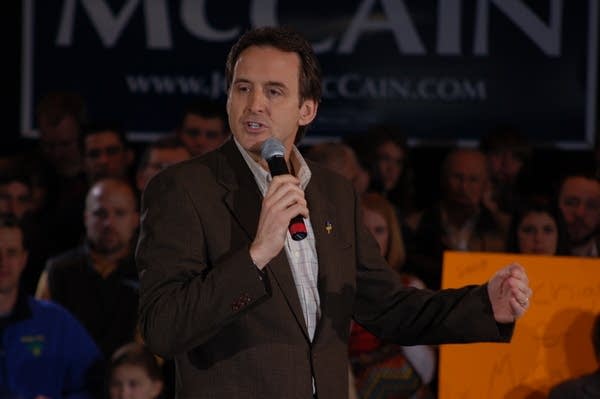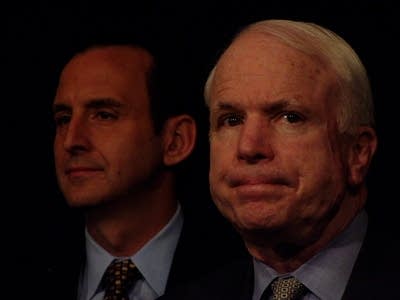Pawlenty's road to the national spotlight
Go Deeper.
Create an account or log in to save stories.
Like this?
Thanks for liking this story! We have added it to a list of your favorite stories.

In 2001, Minnesota House Majority Leader Tim Pawlenty was considering a run for the U.S. Senate -- a run that would have forced an endorsement battle with St. Paul Mayor Norm Coleman.
Pawlenty dropped that bid on the very morning he was going to announce, after Vice President Dick Cheney called him.

"Vice President Dick Cheney called me and said that he had been in touch with the president. And that on behalf of the president and the vice president of the United States, they asked that I not go forward with this effort and not engage in the battle against Norm Coleman and eventually against Paul Wellstone," Pawlenty said at the time. "For the good of the party, I am going to not pursue exploring the United States Senate in the 2002 election."
Instead, Pawlenty turned his focus to the governor's race in 2002. He won a marathon Republican endorsement battle against millionaire businessman Brian Sullivan.
Turn Up Your Support
MPR News helps you turn down the noise and build shared understanding. Turn up your support for this public resource and keep trusted journalism accessible to all.
In the months leading up to the convention, Pawlenty shaped a message that he relies on when he talks to Republicans today -- that the party should be about Sam's Club, not the country club.

"This is not just the party of big business, or the job environment or cutting taxes. This is the party that's gotta have somebody who has a blue collar background, who understands that part of what government needs to do is provide opportunities for folks," Pawlenty said.
Pawlenty has used his working-class background to his political advantage.
As many Minnesotans first learned during the 2002 campaign, Pawlenty grew up in South St. Paul. He is the son of a truck driver. His mom died when he was young, and he was the first in his family to go to college.
His background, along with his no-new-taxes pledge, helped him win a plurality of the vote in a three-person race.
Pawlenty entered the governor's mansion as one of the most conservative governors the state has seen in quite some time.

In his first year in office, he signed a bill into law that allows Minnesotans to carry concealed handguns, and one that requires a 24-hour waiting period before women can have abortions. And he erased a $4.5 billion state budget deficit without raising taxes.
He has also learned how to rev up a partisan crowd, a job requirement of any vice presidential candidate. Here's Pawlenty addressing the Republican delegates when he was endorsed for re-election in 2006.
"I can tell you what your worst nightmare is. It's one of the big spending, tax raising, abortion-promoting, gay marriage-embracing, more-welfare-without-accountability-loving, school-reform-resisting, illegal-immigration-supporting Democrats for governor who think Hillary Clinton should be president of the United States."
Some have argued that Pawlenty's budget choices left the state in worse shape. They say he's cut access to health insurance, that Minnesota schools are underfunded, and that other public services are getting short shrift.

They also say he balanced the books by increasing user fees -- most notably a cigarette fee -- and forced local property tax increases by passing on costs to local units of government.
In 2006, DFL Rep. Tom Rukavina criticized Pawlenty for touting his working-class roots and then turning his back on working men and women.
"This guy is a faker. And he comes off as such a nice person. He isn't. He's turned into a very mean-spirited person," Rukavina said.
In 2006, a plurality of the voters in another three-person race disagreed with Rukavina and elected Pawlenty to a second term.

That election -- in a year when Republicans were routed across the country -- helped raise the governor's national profile.
His term as chair of the National Governors Association, his work on some nationally-known education policy groups, and his campaigning for John McCain also helped catch Republican eyes.
Pawlenty's unwavering support for John McCain -- even when McCain's campaign was declared dead by political pundits -- also endeared him to the Arizona senator.
Since March 2007, Pawlenty has traveled the country extensively to campaign for McCain. He co-chairs McCain's campaign and traveled with him to states like Iowa, New Hampshire, Florida and Michigan.

Here's Pawlenty talking to a group of 500 Republicans in Grand Rapids, Mich.
"You look at John McCain's life, it is a story and message that speaks volumes, eloquently and deeply about our country and our values and our party," Pawlenty said. "Newsweek said this about John McCain a few years ago. His character has been tested in ways that other politicians can only imagine, and you know what I'm talking about."
Pawlenty's critics say the governor has been focused on higher office at the expense of his day job.
Pawlenty's travels have meant that the governor has been spending fewer days in Minnesota. His public events schedule is left blank on most days.

An analysis of his known travel also found that he was out of the state one out of every three days during the first two and a half months of the year. The governor says most of his campaigning has been on nights and weekends.
Pawlenty's selection as McCain's running mate means the governor will spend even fewer days in Minnesota. He'll be McCain's supersurrogate. He'll be expected to raise money, campaign in battleground states and harshly criticize Barack Obama, as he did in June.
"I think people would like to see, do you have the requisite wisdom and judgment and discernment, and that is in part a function of experience. Literally three or so years ago, Barack Obama was a state legislator," said Pawlenty.
Some may question whether Pawlenty has the necessary experience to be commander in chief. If McCain is elected, Pawlenty would be a heartbeat away from the presidency. It's an issue that voters will have to consider because McCain would be the oldest candidate ever elected to a first term.

Chris Gilbert, a political science professor at Gustavus Adolphus College, said Pawlenty does not really have a strong national record.
"He's been governor of a relatively small state for six years. That's certainly not an insurmountable obstacle," said Gilbert. "But when one sits down and says, 'Is this vice president clearly qualified to take over the position from day one?' I suspect that lots of voters are going to have some questions of whether that's true of Tim Pawlenty."
Gilbert says Pawlenty will bring a youthful energy to the McCain ticket, but he says that doesn't guarantee that he'll bring along Minnesota's 10 electoral college votes.
In his two elections, Pawlenty has not won a majority of the vote in Minnesota. Recent polling also suggests the choice of a running mate won't make a difference in most people's vote for president.

There could be some drawbacks to a McCain/Pawlenty ticket. In 2002, Pawlenty was fined $100,000 for coordinating a TV ad with the Republican Party.
He also revealed that he was paid about $60,000 from a telecom firm owned by a friend. At the time he could not explain fully the work he did as a consultant for the firm.
Pawlenty might also take criticism from Democrats for his vetoes of transportation funding bills, both before and after the collapse of the Interstate 35W bridge in Minneapolis on Aug. 1, 2007.
The disaster that killed 13 people became a symbol of the nation's declining investment in roads and bridges, even though it's not clear that a lack of funding was directly responsible.
Pawlenty has also gone back on his word that he's committed to serving his full term as governor. Since he first announced his campaign for re-election in 2006, Pawlenty has repeatedly stated he would serve out his term.
"For the 900th time, I am not running for vice president, I don't want to be vice president, and I'm focused on being governor of the state of Minnesota and have said that I will fill out my term," Pawlenty said months ago. "People can continue to use that as a jab or something like that, but it's not reality."
The voters of Minnesota will have to consider whether Pawlenty's promise to serve a full term outweighs the prospect of having a Minnesotan serving as vice president. They have until November to decide.
Dear reader,
Political debates with family or friends can get heated. But what if there was a way to handle them better?
You can learn how to have civil political conversations with our new e-book!
Download our free e-book, Talking Sense: Have Hard Political Conversations, Better, and learn how to talk without the tension.






